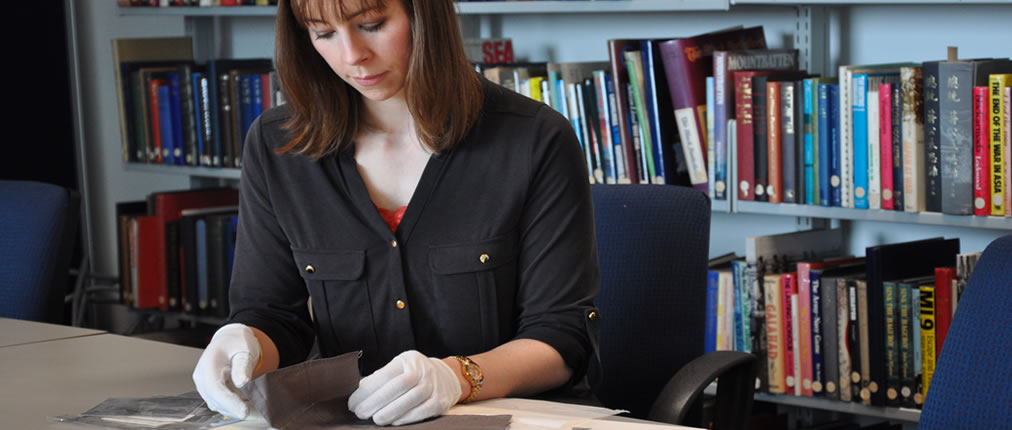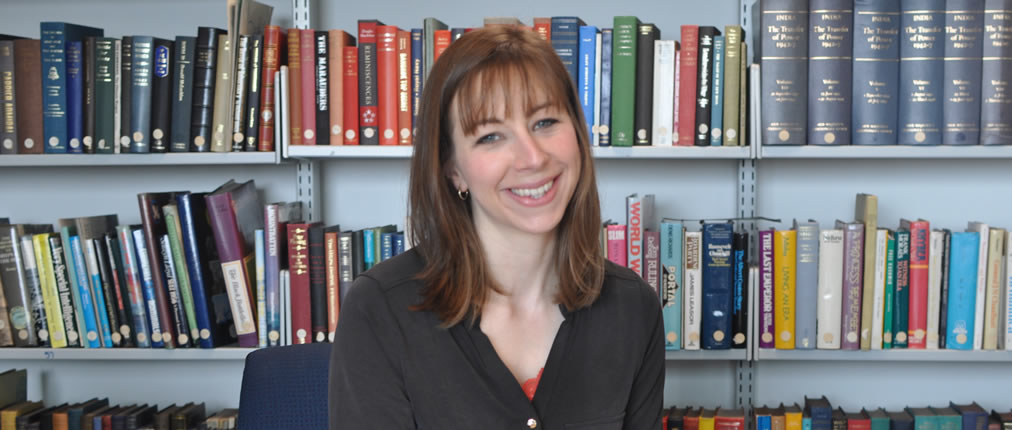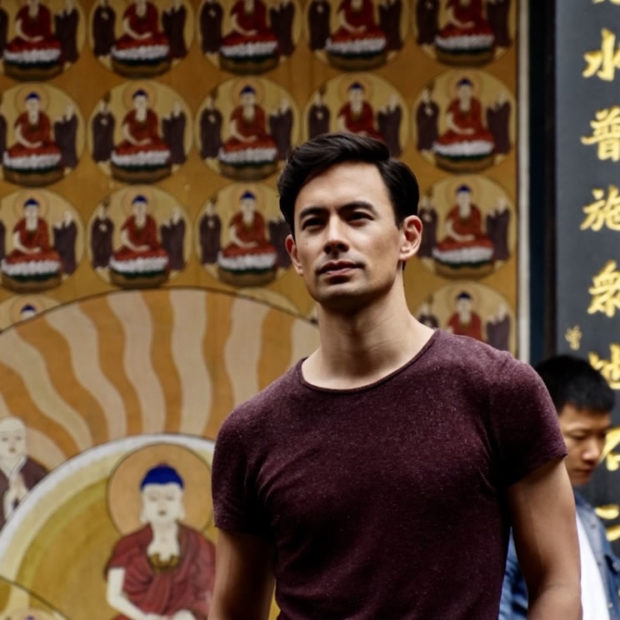Hartley News Online Your alumni and supporter magazine
Eleanor Houghton (MA History, 2014; PhD History, third year) has taken her knowledge of English literature, history and fashion to a new level. Her groundbreaking revelations about the Thackeray Dress are just one of the ways she’s changing perceptions of Charlotte Brontë.
She talks to Southampton Connects about crossing disciplinary boundaries and how being a Wolfson scholar has made it all possible.
Could you outline your research and give us an overview of what you’re doing for your PhD at the moment?
My work focuses on Charlotte Brontë’s complex relationship with her plain physical appearance and how this is revealed in her novels, personal writings and in her extant clothing.
Though often overlooked, dress can be hugely illuminating. When ‘read’ alongside other more traditional historical and literary sources, it can reveal much about both the conscious and unconscious attitudes and responses of any individual, and offer new insight into their life, and in this specific case, their work.
What does your research mean for those interested in this area; is it going to be really significant?
I hope it will be! Certainly, my aim both now and in the future is three fold. Firstly, to fully explore and document the entire Brontë clothing collection, which has never previously been studied in any detail. Secondly, to bring together knowledge from across the disciplines – whether literature, history, psychology or the study of dress – to gain a deeper understanding of Charlotte Brontë’s life and work. Thirdly, to underscore the significance of dress and all that it has to offer, and to release it from its denigrated position with its connotations of frivolity and irrelevance.
I hope too that my findings about individual items of Charlotte Brontë’s clothing are going to prove hugely exciting to scholars and enthusiasts alike, and that these will go some way to sartorially separate the author from her most famous female protagonist, Jane Eyre.
Charlotte Brontë and her work are very famous worldwide. Do you think your research will impact on society too?
Of course, one always hopes so! I think that we as academics have a responsibility to enthuse, inspire and educate, and to make sure that our work has impact beyond the academic sphere. I have tried hard to disseminate my research more widely and to adapt it to many different audiences.
Though I have been amazed by the generally enthusiastic response, this process has made me aware that, in order to engage the current and next generation, we have to be flexible in our approach. I have also come to recognise that there is a direct connection between public engagement and the safeguarding of our national treasures, such as the Brontë clothing collection. Unless we find ways to impassion and to connect with the general public, the future of these items will become increasingly uncertain.
You’ve mentioned the interdisciplinary nature of your work, and along with working across English, history and psychology, there’s also a scientific element. Could you explain a bit more about how you are collaborating with other departments and academics at the University?
It was at a University event for the Wolfson Foundation that I met Professor Philip Bartlett, Head of Electrochemistry here at Southampton. We got chatting about our respective areas of research and I spoke of my recent work on Charlotte Brontë’s Thackeray Dress. He suggested that it might be possible to pinpoint the dyes, mordants and fibres used in the fabric of the dress and subsequently introduced me to Professor Andrea Russell. Over the past year I have been working alongside Andrea and PhD students Danai Panagoulia and Alex Keeler. Having extracted fibres from two of Brontë’s dresses, we have used Raman spectroscopy and other non-destructive techniques to uncover more about these fascinating garments and their complex manufacturing history.By coming together in this way – combining my knowledge of the history of the dress and of the dyes used in the period, with their scientific expertise and application of the newest techniques and technology – we have been able to make some really exciting new discoveries, which have
By coming together in this way – combining my knowledge of the history of the dress and of the dyes used in the period, with their scientific expertise and application of the newest techniques and technology – we have been able to make some really exciting new discoveries, which have impact beyond that of Charlotte Brontë.
The Wolfson Foundation is one of the country’s most important organisations in the support and promotion of excellence in the fields of science, health, education and the arts and humanities. You’re a Wolfson Scholar; what has the Wolfson Foundation done for you and how has it made things possible?
First and foremost, without the generosity of the Wolfson Foundation, my research would simply not have been possible. It has given me freedom, because I have not been constrained financially, which is often a problem in the humanities subjects. There is no doubt too that the name of the Wolfson Foundation has added a gravitas to my studies that has proven beneficial when working with outside agencies. It has also provided me with useful connections – indeed, my recent collaboration with Electrochemistry at the University would never have happened without the involvement of the Wolfson Foundation.
I am incredibly grateful for the Foundation’s work and generosity and believe that the connections offered will continue to be a rich resource for all of us in the long term.
I have to say that I feel the responsibility of the opportunity that they have given me very keenly. I feel as though the money given to me has been an investment in who and what I am and I hope that in the future, I will be able to give support to others after me.
What other opportunities have you had that have arisen with your work and your title as a Wolfson scholar?
I have had a huge number of opportunities. Last year, I organised an international bicentennial conference for Charlotte Brontë at Chawton House Library. I have also worked with the BBC as a historical costume advisor on their productions, Being a Brontë and To Walk Invisible. This is exciting because television shows like these are often the only interaction that some people have with either history or literature. It is consequently important to attempt to make them as accurate as possible, within the various constraints of the medium.
I have spoken at numerous events – both public and academic – and most recently at the Brontë Society Annual General Meeting. I have made historically accurate bonnets, helped install Brontë’s dresses at the Sir John Soane’s Museum and acted as advisor to the Morgan Library, New York and to Tracy Chevalier in Yorkshire.
I am also in the process of curating a couple of exhibitions about the life and works of Charlotte Brontë, in which I hope to include some of the results of the recent collaborative experiments.
What’s next for your research?
Well, first I must finish my thesis! But there are lots of other things going on alongside this. I am currently co-editing a collection of essays to celebrate Charlotte Brontë’s recent bicentenary, and am working on another project with the BBC. Alongside this, I am advising on a historical novel, and talks about future exhibitions are ongoing. We also have the next experiments to finish on Charlotte Brontë’s Going Away Dress. I am keen to publish parts of my master’s thesis on Jane Austen’s clothing and, in the long term, I want to complete the next stage of my work on the Brontë Clothing Collection.
Of course, as I come to the end of this stage of my research and look to new chapters in life, there is always a sense of uncertainty, but I hope that my work will have made at least a small ripple in a very large pond.
Paul Ramsbottom, Chief Executive of the Wolfson Foundation, added:
“We are delighted to be funding such brilliant students through our programme of Wolfson Postgraduate Scholarships in the humanities, to which we have now committed £13m since 2012.
“Eleanor’s project is a wonderful example of the brilliant study that Wolfson Scholars undertake. It is exciting that an introduction to Professor Phil Bartlett, himself a Wolfson Research Merit Awardee (in chemistry), gave birth to this inspiring collaboration, and produced a truly interdisciplinary piece of original research. We wish Eleanor every continued success and look forward to hearing about her future achievements.”
If you have a story you would like to share with your alumni community, please get in touch with Rachael Tyler, Communications Officer, at R.E.Tyler@southampton.ac.uk




